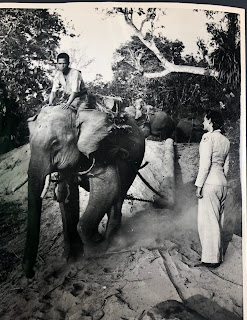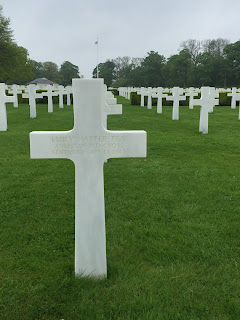Each Christmas I enjoy re-reading a blog post that a man wrote in tribute to his mother, who had served as a Red Cross Girl in Europe from 1943-45. Unfortunately, it seems the original blog is now behind a pay site, which is very sad as I don't think I ever printed out a copy.
Thankfully I've blogged about it before and can refer back to my previous reflections. In the man's memory, there was such a contrast between the small tabletop Christmas tree decorated with simple handmade decorations (paper chains and ornaments, popcorn strings and the like) and the larger "real" tree that his family decorated for their living room each year. It wasn't until many years later, when he read his mother's wartime journal, that he understood why she always wanted to put up that smaller tree each season. Her journal recounts how she and her fellow Red Cross Girls set up a similar tree in Belgium in December 1944.
For those that might not recall, the Germans launched a deadly counter-offensive (later known as the Battle of the Bulge) in mid-December 1944, and several Clubmobiles and their crews were unexpectedly caught behind or very near enemy lines. Even the crews who had been serving far back from the front in western Belgium were forced to trek back into France for safety. It was Christmas Eve before all the women safely reached their units back in France.
Though they were thrilled to mark the holiday with simple decorations and whatever food and liquor they could scrounge from supplies, the women were also mourning the loss of one of their own. A Red Cross Girl, recuperating from a mild illness in a hospital, was killed during a bombing raid on the hospital, and word of her death reached the others shortly before Christmas.
Putting up this small simple tree was one of the ways his mom coped with stressful memories of her wartime service. Many Red Cross Girls, like the servicemen who fought, returned home changed in no small measure and continued to be affected for years afterward. His mother also nestled photos of "her boys" in the branches of that small tabletop tree -- that bitterly cold and uncertain Christmas of 1944 lived powerfully in her memory for the rest of her life.
My wish for 2025 is that we might all recall the selfless spirit of the Greatest Generation and be guided by the kindness, generosity of spirit, and optimism for a brighter future that motivated both the servicemen and servicewomen of that bygone era. Wishing all of you a festive holiday season, a Merry Christmas, and New Year filled with health, happiness, and love!
You can buy my books on Amazon and learn more about me and my writing on my website.












































